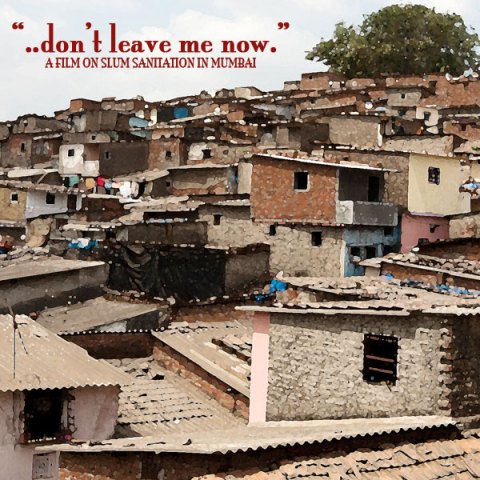the DVD pocket design of “..don’t leave me now.”
March 8, 2009
“..don’t leave me now.”, Documentary, 16 minutes, English/Hindi/Marathi with subtitles in English, High Definition Video
The Slum Sanitation Program or SSP is the initiative of the Municipal Corporation of Greater Mumbai. The program aims at building sustainable toilet blocks in the slums of Mumbai and training slum dwellers to operate and maintain them. Phase I of the SSP was initiated with financial aid from the World Bank. SSP toilets are built on the demands of slum dwellers. The toilets are clean and well maintained and this responsibility lies with Community Based Organisations or CBO. The CBO consists of enterprising slum dwellers who live at close proximity to a toilet block. Every CBO hires a resident caretaker who lives at the uppermost level of the toilet block along with his or her family. “..don’t leave me now.” is a film that takes a look at the concept, implementation and success of the Slum Sanitation Program.

The Slum Sanitation Program in Mumbai
August 24, 2008
The city of Mumbai was widely sought after primarily because it is a natural harbor that can handle large volumes of cargo. It became India’s primary port exporting titanic amounts of goods, thus creating enormous job opportunities since very early days. These opportunities were eyed by people from every other state, city and village in the country. People flocked the city trying to make a living. They dreamt of steady jobs, an increase in income and better standards of living. On arriving in Mumbai, they set up little shanties or slum pockets at various parts in the city. This was a temporary arrangement as they aspired to be able to afford better accommodation once they found work and started to earn a steady income. Hundreds of families would travel together into Mumbai and set up shanties wherever possible. These shanties had neither electricity nor water supply and absolutely no sanitation facilities. As time passed, these same temporary shanties were reconstructed, built of bricks and cement. Due to large numbers of people living per square area, there was no scope for them to expand their home. Large families had to squeeze into tiny houses. There might have been no space and sewage lines to construct individual toilets, but the fact of the matter is that the thought never occurred to them. That’s because they didn’t have individual toilets in their place of origin either. They would scott at a secluded place close-by. This practice continues amongst slum dwellers even today. Today, some villages have adopted a “Deification Free Village Policy”. Yet, open deification is a problem in the city of Mumbai even today.
